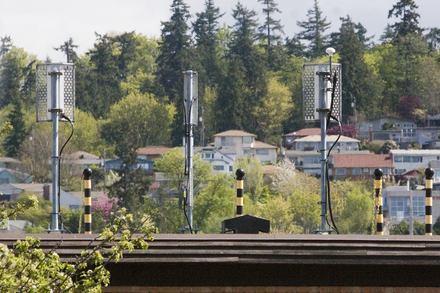Back to the drawing board for cell towers
MORE ANTENNAS BLOCKED. A hearing examiner reversed the conditional use decision made by Seattle's Department of Planning and Development because it had been made without requiring Verizon Wireless to consider other locations for the cell antennas.
Mon, 12/01/2008
For a while, at least, residents have successfully blocked more cell phone antennas on top of an Admiral Way apartment house.
Residents living near the Soundcrest Apartments at 6609 SW Admiral Way opposed more Verizon Wireless antennas on the building after filing an appeal.
Last week, a hearing examiner reversed the conditional use decision made by Seattle's Department of Planning and Development because it had been made without requiring Verizon Wireless to consider other locations for the cell antennas.
Jim Borrow, a local resident who led his neighbors through the appeal process, said he does not expect this will prevent Verizon from eventually constructing the cell antennas, but that the company will be forced to follow the necessary steps.
"I feel fortunate that we got as far as we did," said Borrow.
Alan Justad, deputy director at the Department of Planning and Development, said because Verizon already had antennas on the apartment, and because the company was planning to build a "penthouse" screen around the antennas, it was decided that adding more would not be intrusive to the neighbors.
Verizon currently has three cell antennas on the roof of the Soundcrest Apartments, ranging from four feet to eight feet high. After applying with the city to install eight more antennas, each measuring ten feet five inches above the rooftop structure.
But Seattle's Director's Rule 8-2004 identifies an order of preference for minor communication utilities, such as cell phone antennas. The most preferred site for these structures would be in industrial zones. The least desirable location would be in a single family residential on non-arterial streets - such as the neighborhood of Soundcrest apartments.
The department claimed the rule did not apply to Verizon's project because it was not a new facility.
The hearing examiner disagreed, insisting that the project is an expansion, to which the city rule applies.
According to the hearing examiner's findings, Verizon's application did not consider any other sites, and therefore could not be proven to be the least intrusive location.
The hearing examiner did, however, uphold the State Environmental Policy Act ordinance approval, suggesting that the visual impact of the antennas had been minimized by Verizon as much as practically possible.
The examiner ruled against the neighbors claim that the penthouse exceeds the allowable height for rooftop equipment, and found that it did not block public or private views of the water. It was also determined that the community had presented no evidence of noise impacts.
While neighbors of the Soundcrest Apartments had been concerned about radio frequency radiation coming from the antennas, the Federal Telecommunications Act specifically prevents local government from regulating possible health effects of such devices.
Verizon Wireless was not immediately available for comment on the decision and whether it will reapply for conditional use of the site.
Borrow says that he and his neighbors will continue to fight the construction of any cell antennas in their neighborhood.
Rose Egge may be reached at 932.0300 or rosee@robinsonnews.com


